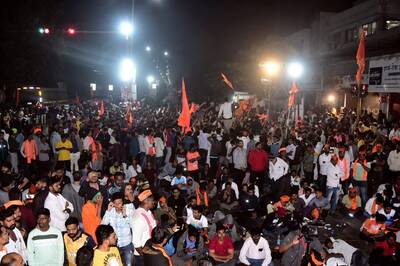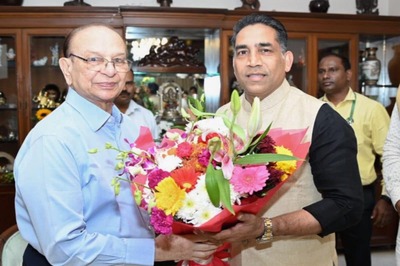
views
New York: The press freedom group Reporters Without Borders named 13 countries as the worst culprits for online censorship, singling out China, Cuba, Iran and North Korea among others.
Also on the list released Tuesday is Belarus, Egypt, Myanmar, Saudi Arabia, Syria, Tunisia, Turkmenistan, Uzbekistan and Vietnam.
An online protest was ending at 5:00 on Wednesday EST (10:00 GMT).
''No one should ever be prevented from posting news online or writing a blog,'' said the Paris-based group, Reporters Sans Frontieres in French, which taps more than 100 journalists who are ''keeping us informed.''
Worldwide, 61 people, 52 in China, are in prison for posting what the countries claimed was ''subversive'' content, the reporters' group said in its annual report.
The cyberspace demonstration was advertised in Manhattan in Times Square and in Bryant Park -on truck-transported billboards.
As of Tuesday afternoon, 10,000 people had registered their protest, with black holes on the group's Web site gradually disappearing with each click, said the group's spokeswoman in Washington, Lucie Morillon.
The 13 countries ''censor and block online content that criticizes them,'' the organisation said in defining its protest.
''Multinationals such as Yahoo! cooperate with the Chinese government in filtering the Internet and tracking down cyber-dissidents.'' Morillon said.
Reporters Without Borders said it obtained a copy of the verdict in the case of Jiang Lijun, sentenced to four years in prison in November 2003 for his online pro-democracy articles in China.
Reporters Without Borders said that the search engine company Yahoo! Inc had helped Chinese police identify him.
''It's one thing to turn a blind eye to censorship, it is another thing to collaborate,'' Morillon said.
In a statement, Yahoo! said: ''We continue to employ rigorous procedural protections under applicable laws in response to government requests for information, maintaining our commitment to user privacy and compliance with the law.''
PAGE_BREAK
In Cuba, Reporters Without Borders said that the government ''ensures that there is no Internet access for its political opponents and independent journalists, for whom reaching news media abroad is an ordeal.''
The punishment for writing ''a few counterrevolutionary articles'' for foreign Web sites can be years in prison, it said.
Many Cubans can get simple e-mail accounts through government workplaces, universities, schools and post offices.
However, most Internet access is limited to a government-run intranet that filters out content considered counterrevolutionary.
Private Internet accounts paid for in foreign currency and allowing unfettered Web access are restricted to foreigners and Cubans with special government permission.
Reporters Without Borders said that it tracks cases of online repression in various ways, including through court cases and reports of arrests by family and friends.
The nonprofit group, founded in 1985 by French journalist Robert Menard, is 70 per cent funded by sales of its magazine, Reporters Without Borders For Press Freedom, which includes photos of journalists in jail. About 200,000 copies are printed three times a year.
Nepal, Maldives and Libya have been removed from Reporters Without Borders' annual list of Internet enemies.
However, there's an addition to the list, Egypt, where it said ''many bloggers were harassed and imprisoned this year.''
The group said Egypt detained three bloggers in June and held them for two months for advocating democratic reform.
It also expressed concern over a recent Egyptian court ruling that said an Internet site could be shut down if it posed a threat to national security.
Last month a handful of Internet bloggers reported that hooligans had sexually harassed women at night in downtown Cairo in full view of police who did not intervene.
The Egyptian government denied that such assaults took place and accused the bloggers of defaming the country.




















Comments
0 comment